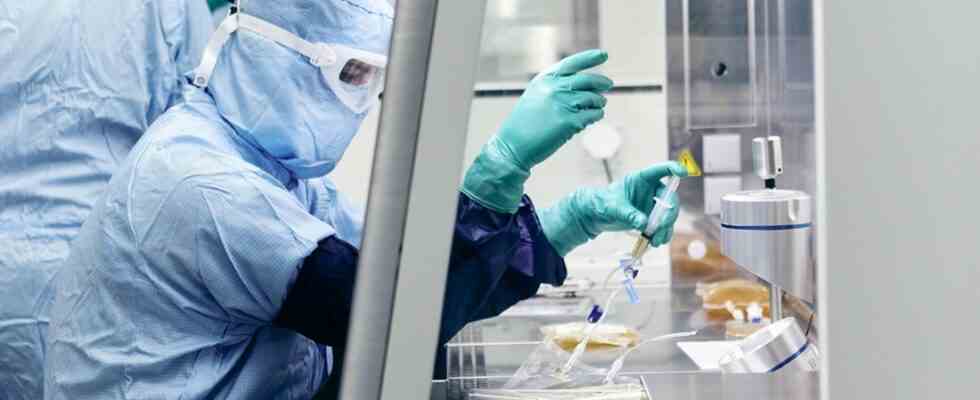Considering that a new era is about to begin for Novartis this year, the pharmaceutical company presents itself quite soberly on this February morning. CEO Vas Narasimhan, who took office exactly five years ago, discusses the figures for the fourth quarter and the full year 2022 succinctly and dryly, which could be due to the fact that the balance sheet is rather mixed: net income fell by a gigantic 71 percent to $ 6.96 billion, which is also related to the sale of the Roche share package, which had a strong impact on the previous year’s result. But even apart from that, analysts see weaknesses, for example in sales development. The balance sheet did not cause enthusiasm on the stock exchange either, the Novartis share fell slightly. A spirit of optimism on the Novartis Campus in Basel not far from the Rhine? You don’t really feel it this Wednesday.
It should be completed this year, the change from the former general store to a pure pharmaceutical company. Novartis boss Narasimhan has been driving the streamlining of the former conglomerate since he took office in 2018, first he sold the over-the-counter medicines business and then in 2019 he spun off Alcon, the Novartis subsidiary that specialized in products and medicines for ophthalmology. The last step is to follow in the second half of 2023: Novartis wants to get rid of its generics subsidiary Sandoz, i.e. the business with generic drugs. A listing on the Swiss stock exchange is planned, but a sale has not yet been ruled out. The Novartis management announced on Wednesday that the spin-off was “on course”. At the end of 2023, the group should only be concerned with “innovative medicines” – i.e. those that are patent-protected and thus promise a lot of sales and profits. Already today, 80 percent of Novartis sales come from the business with new medicines.
Novartis is thus following a larger trend in the pharmaceutical industry. Almost all large companies in the industry have been parting with the so-called ancillary businesses for several years and are repositioning themselves as almost exclusively research-oriented drug manufacturers. The specialization is intended to bundle the strengths of the companies and ultimately increase the pace of the innovations that ultimately bring in the money.
But can that work? Is focusing really such a sure-fire success? So far, Sandoz has provided at least one-fifth of sales, and in contrast to the risky new developments, the business with generics is usually a reliable one.
CEO Narasimhan is still sure of his strategy. He recalls on Wednesday that most pharmaceutical companies used to be more diversified than they are today. “But that didn’t greatly reduce the volatility of the business.” In addition, research is developing at breakneck speed. “It’s challenging to keep at it and still make contact lenses and generics on the side,” said Narasimhan.
And yet: During the pandemic, Novartis was not one of the pharmaceutical companies that could contribute anything in terms of vaccines, drugs or tests. Both the vaccine division and the diagnostics of Novartis had long since been sold at the beginning of the pandemic. Roche, the local rival from the other bank of the Rhine, was able to provide the world with corona tests thanks to its diagnostics department. Novartis, on the other hand, had to slip into the role of supplier and help Biontech fill its vaccine.
A pandemic is not normal. And Novartis, that is also part of the truth, is still in the middle of the transformation phase. It was only last April that the group announced that it would merge the pharmaceuticals division with the cancer drugs division, resulting in the new “Innovative Medicines” division. In addition, there are further changes at the group management level – and a radical job cuts. 8,000 of the then 108,000 employees worldwide, Novartis admitted last summer, are to be laid off altogether. “The unboss can also be tough,” wrote the Swiss trade newspaper at the time in an allusion to the “unbossing” cultural change that Vas Narasimhan proclaimed when he took office in 2018.
In fact, five years later, the initial charm of the 46-year-old Narasimhan is no longer felt. The American passed on the question about the jobs already cut to his chief financial officer, Harry Kirsch, on Wednesday: The majority of the layoffs, he explained, will take place this year. The company currently writes of only 106,000 employees.
Narasimhan’s strategy of slimming down and actually downsizing may prove to be the right way forward. In any case, Marie-France Tschudin will play a key role. The Swiss manager, who was previously responsible for the pharmaceutical division of Novartis, has taken over the management of the new area of innovative medicines and also acts as “Chief Commercial Officer”. This makes her number two behind Narasimhan – and probably the most powerful woman in the Swiss economy. Under her, Novartis will focus on five core therapeutic areas – cardiovascular disease, immunology, neuroscience, solid tumors and hematology – as well as the key markets of the United States, China, Japan and Germany.
The fact that the pharmaceutical industry is coming under more and more price pressure doesn’t make Tschudin’s new task any easier. “Health care must be seen as an investment, not as a cost,” she said in an interview with journalists on Wednesday. The new strong woman in Basel still has to show whether she can convince the health ministers in Novartis’ key markets.

